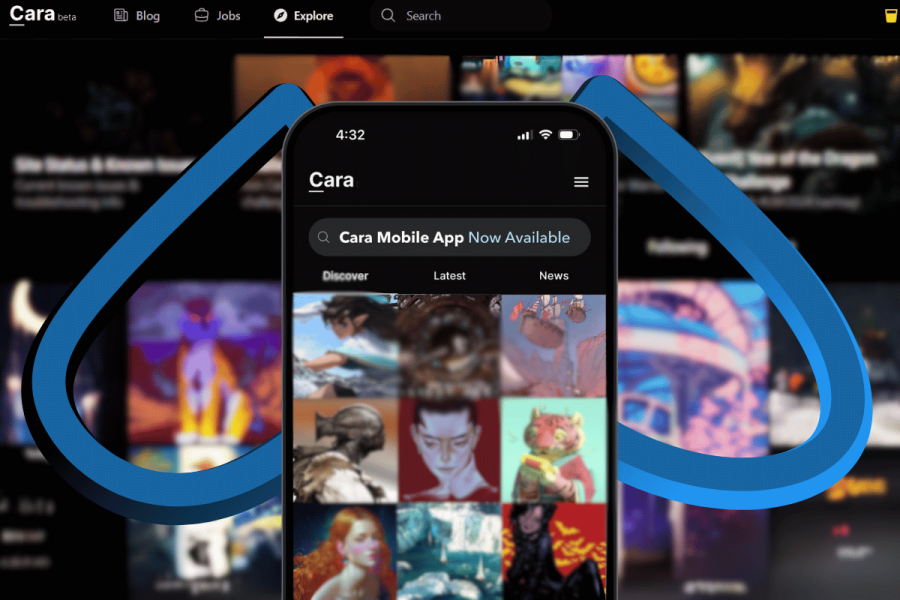Artists are increasingly migrating from Meta to Cara, a new app that has banned AI-generated content and the use of artwork for AI training. This shift follows allegations that Meta has been using their artworks to train AI models. In response, artists have started to mobilize on social media, sharing messages and templates to voice their protests.
For a long time, Instagram has been a pivotal platform for artists to showcase their work and gain exposure. However, its parent company, Meta, has faced backlash for allegedly using these artworks to train their AI model.
A Meta executive disclosed in May that the company views public Instagram posts as potential AI training material. Shortly after, in June, Meta told its European users that their posts would be used for AI training starting June 26, with no option to opt-out—although EU residents may contest the use of their data.
Cara grew from 40k to 650k users in a week because artists are fed up with Meta's AI policies
We're 700k now! – https://t.co/173IKv4CDo 1/ pic.twitter.com/XFae5XBD4V
— Jingna Zhang @ cara.app/zemotion (@zemotion) June 6, 2024
Consequently, in just over a week, Cara’s user base soared from under 100,000 to 700,000 profiles, skyrocketing it to the top of the app store rankings.
The relationship between online creators and AI firms is becoming increasingly strained. Currently, most publicly shared content on the internet is up for grabs by AI developers. This raises concerns about AI potentially supplanting the creators of the original content, including writers, musicians, and visual artists.
What is the Cara app?
Cara is a social networking application made for creatives, allowing artists to share their work, memes, or personal thoughts in text form. It looks similar to well-known platforms like X (formerly Twitter) and Instagram and has both a mobile app and browser access.
Photographer Jingna Zhang, alongside a group of engineers and contributors, developed Cara. The team states that it is committed to remaining at the cutting edge of technology and champions the rights of artists. They say, “The future of creative industries requires nuanced understanding and support to help artists and companies connect and work together.” In addition, they add that they aim to “bridge the gap and build a platform that we would enjoy using as creatives ourselves.”
There's a wide gulf between the tech and art community, and I spend a lot of time thinking about how we can understand each other better. 2/ pic.twitter.com/of2ojwxuOD
— Jingna Zhang @ cara.app/zemotion (@zemotion) June 6, 2024
Posting on X, founder Zhang said: “There’s a wide gulf between the tech and art community, and I spend a lot of time thinking about how we can understand each other better.
“Building a product is a bit like making art. I don’t think everyone needs to love it, but so long as I’m building something I would like myself, I think there might be people out there who would enjoy the same. And we would find our community together,” she added.
I won. I won my appeal.
The Luxembourg court has ruled that Jeff Dieschburg infringed upon my copyright when he used my work without consent.
Using a different medium was irrelevant. My work being 'available online' was irrelevant. Consent was necessary. 1/ pic.twitter.com/f9GrmUScCY
— Jingna Zhang @ cara.app/zemotion (@zemotion) May 10, 2024
Zhang is no stranger to the pitfalls of AI. She has championed artists’ rights, securing a victory in a Luxembourg court case against a painter who copied one of her photographs taken for Harper’s Bazaar Vietnam.
Is Cara using AI?
As a result, Cara states that it does “not agree with generative AI tools in their current unethical form.” The team added that the app will not host AI-generated portfolios “unless the rampant ethical and data privacy issues around datasets are resolved via regulation. “
In the event that legislation is passed to clearly protect artists, Cara says AI-generated content should be clearly labeled for the public to be able to search for human-made art and media easily.
Featured image: Canva / Cara


















